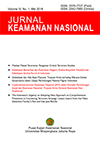The Indonesia’s Urgency on Adopting New Approach on Comprehensive Prevention in Countering Terrorism Strategy: Lesson Learnt from the Mako Detention Facility’s Riot and East Java Bombs
Keywords:
terrorism; radicalism; prison management.Abstract
Indonesia was confronted with a series of terror attacks in May 2018, among others: riot incidents accompanied by police hostage by terrorist
prisoners at Mako Brimob Prison in Kelapa Dua, Depok on May 8, 2018, a suicide bombing occurred in three churches simultaneously on Sunday morning, 13 May, suicide bombing at the entrance of Polrestabes Surabaya on May 14th. This series of events shows that terrorism remains a security threat in Indonesia. Several terror attacks in Indonesia are believed to have been committed by terrorist groups baited to ISIS. Indonesia in the context of countermeasures against acamanism has used a number of approaches both soft approach and hard approach by using the criminal justice model. Nevertheless, Indonesia has modified the criminal justice approach by involving the role of the military. Therefore, it is necessary to understand the various forms associated with the hard approach. and how do new strategies also need to be considered looking at existing threats? This paper attempts to explore possible new strategies adopted by Indonesia as a continuation of the UN response to the problem of violent extremism. This paper is a further development of the research results of the Center for National Security Studies (Puskamnas) Bhayangkara Raya University of Jakarta is on the global map of terrorism.
Downloads

Downloads
Published
Issue
Section
License
Please read and understand the copyright terms for submissions to this journal.
Copyright Notice
The Jurnal Keamanan Nasional is under the Creative Commons Attribution 4.0 International (CC-BY 4.0) License, according to which:
1) Authors retain copyright and grant the journal the right to first publication, with the work simultaneously licensed under the Creative Commons Attribution (CC-BY 4.0) that allows the sharing of articles published with the acknowledgement of authorship and the initial publication in this journal.
2) The authors are authorized to make additional contracts separately for distribution of the version of the work published in this journal (for example, publication in an institutional repository or as a chapter of the book), as long as there is recognition of authorship and initial publication in this journal.
3) Authors are authorized and encouraged to publish and distribute their work online (for example, in institutional repositories or on their personal pages) at any time before or during the editorial process, as it increases the impact and reference of the published work.












